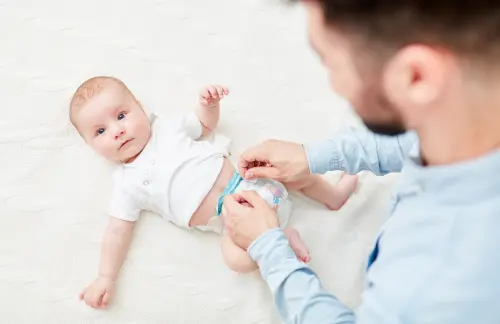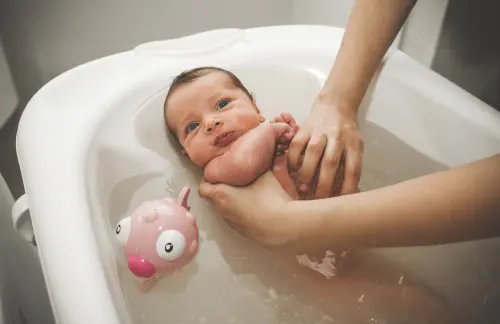What do newborns do all day? It’s a question that often sparks curiosity and wonder among new parents and caregivers.
In the hustle and bustle of caring for these tiny bundles of joy, it’s easy to marvel at their seemingly endless cycle of sleeping, feeding, and occasional cries.
But beyond these basic activities lies a world of exploration and development that unfolds with each passing moment.

Join us as we embark on a journey to uncover the daily routines and intricacies of newborn life, from their unique sleep patterns to the subtle nuances of their budding senses.
What do newborns do all day?
Newborn babies eat, sleep, poop, pee, and cry a lot. They spend most of their time sleeping and eating every 2-3 hours. Newborns also dirty many diapers per day and enjoy being held and cuddled. In their waking moments, they love looking at faces and objects and making little cooing noises. While newborn babies don’t do much beyond meeting their basic needs at first, they are actively bonding with their parents and absorbing their new world.
A Day in the Life of a Newborn
Feeding

Feeding takes up a large chunk of a newborn’s day. Newborns need to eat frequently, about 8 to 12 times in 24 hours during the first weeks.
Breastfed babies will nurse about every 1.5 to 3 hours, while formula-fed newborns may go 2 to 4 hours between feedings.
Frequent feedings help babies get the nutrition they need and also encourage milk supply for breastfeeding mothers. Newborns often fall asleep during or right after eating.
Feedings for a breastfed newborn may follow this schedule:
- 7 AM – Baby wakes up and breastfeeds for about 15-20 minutes on each side.
- 9 AM – Baby shows hunger cues like rooting and smacking lips. Mother nurses baby again.
- 12 PM – Baby eats again after waking from a nap.
- 3 PM – Baby breastfeeds once more. Mother pumps to build up milk supply.
- 6 PM – Father bottle feeds baby pumped breastmilk while the mother takes a break.
- 9 PM – Baby cluster feeds in the evening with breastfeeds at 9, 10, and 11 PM.
- 2 AM – Baby wakes for a night feeding and breastfeeds before falling back asleep.
Sleeping

Newborns sleep a lot, around 15 to 18 hours per day. However, they spread this sleep out over short periods rather than sleeping through the night right away.
Newborns typically sleep in stretches of 2 to 4 hours around the clock in the early months.
It is usual for a newborn’s sleep pattern to look something like this:
- 7 AM – Baby wakes up from 4 hours of sleep since the 3 AM feeding.
- 9 AM – Baby falls asleep after nursing and naps for 1.5 hours.
- 12 PM – Baby sleeps deeply for 2.5 hours after eating again.
- 3 PM – Baby catnaps for 30 minutes after breastfeeding.
- 6 PM – Baby sleeps for another hour.
- 10 PM – Baby is sleepy and fussy after cluster feeding. Falls asleep for 3 hours.
- 2 AM – Baby wakes for feeding and diaper change, then sleeps until 7 AM.
Newborns may be sleepy after eating and become more alert during other times. Getting enough daytime sleep helps babies sleep longer stretches at night.
Diapering

Newborns require frequent diaper changes as they pee and poop often. Expect to change the baby’s diaper about 8-12 times per day in the early weeks. Here is a sample diapering routine:
| Time | Diaper Check | Change Needed? |
|---|---|---|
| 7 AM | Wet | Yes |
| 9 AM | Wet and poopy | Yes |
| 12 PM | Dry | No |
| 3 PM | Wet | Yes |
| 6 PM | Dry | No |
| 9 PM | Wet | Yes |
| 12 AM | Wet and poopy | Yes |
| 3 AM | Wet | Yes |
Newborn poop can vary from thick and tar-like to loose and seedy depending on if the baby is breastfed or formula fed.
Track the baby’s diapers to make sure they are peeing and pooping enough. Notify the pediatrician if there are any concerns.
Bathing

Newborns only need baths 2-3 times per week. Sponge baths are recommended until the umbilical cord stump falls off and the circumcision heals for baby boys. After this, parents can graduate to give baths in a baby tub or sink.
Bathing helps soothe and relax the baby. A sample bathing routine may look like this:
- Fill the baby tub with warm water—test the temperature.
- Undress baby and place in the tub using one hand for support.
- Gently wash the baby with warm water and mild baby washcloth and shampoo.
- Rinse thoroughly so no soap remains. Pat dry with a towel.
- Lotion and massage the baby, then dress them in fresh diapers and pajamas.
Bathtime is a beautiful bonding experience. Never leave the baby unattended during baths.
Playtime and Bonding

While newborns do not engage in active play yet, they benefit significantly from bonding with parents through touch, sound, and visual stimulation.
Newborns love to be held closely, cradled, rocked, sung to, read to, and taken for walks. Parents can promote bonding and development through activities like:
- Skin-to-skin contact by holding the baby against the bare chest.
- Smiling, cooing, and talking to baby frequently.
- Playing soft music or sound machine during naps.
- Reading colorful picture books and showing baby images.
- Gentle infant massage and stretches.
- Going for a walk outside so baby can observe the environment.
The important thing is to interact warmly, respond to baby’s cues, and soak up these precious early weeks of life!
Physical Development Milestones
The first 12 weeks are a period of rapid growth and development. Here are some of the exciting milestones baby will reach:
- Head control – By 2 months, baby can hold their head steady when supported at the chest or propped on forearms.
- Hand-eye coordination – Baby will start following objects with their eyes around 1 month old and reach for objects by 2-3 months.
- Rolling – Around 3 months, the baby discovers how to move from tummy to back and then back to tummy.
- Laughing/smiling – Baby will begin to smile spontaneously around 6 weeks and laugh out loud by 3-4 months.
- Cooing/gooing – Cooing noises emerge around 6-8 weeks, followed by gooing sounds.
- Grasping – Baby’s grasp reflex emerges right after birth. Around 3 months, they can voluntarily grab and hold objects for short periods.
- Visual tracking – Baby gains the ability to track moving objects with their eyes by 2 months old.
What are Normal Newborn Habits?
While caring for newborns can be tiring, some of their habits are perfectly normal for their stage of development.
Common newborn tendencies include:
- Frequent feeding – Newborns need to eat every 1-3 hours because of their tiny stomach capacity. This frequency helps establish the milk supply.
- Sleeping irregularly – Frequent wakings and irregular sleep are typical. Newborns transition from light to deep sleep cycles often.
- Grunting noises – It is common for newborns to make little grunts, sighs, and gurgles as they learn to pass gas and regulate breathing.
- Sneezing and hiccups – Sneezing helps clear nasal passages. Hiccups are harmless reflexes newborns pick up in the womb. Both tend to subside with time.
- Fussy periods – Crying peaks around 6-8 weeks. Try swaddling, shushing, swinging gently, and sucking on a pacifier to soothe fussiness.
- Spitting up – Up to 60% of newborns spit up small amounts after feeding – usually just milk overflow. As long as the baby is gaining weight, it is not a concern.
While each newborn is unique, these behaviors are generally nothing to worry about! Always consult the baby’s pediatrician with any specific concerns.
Tips for Parents Caring for Newborns:
The newborn period has ups and downs but lots of memorable moments, too. Here are some top tips for parents:
- Sleep when the baby sleeps! Rest is essential – accept help from loved ones.
- Ask for help. Have your partner, friends, and family lend a hand with meals, errands, chores, and giving you a break.
- Take shifts. Split night wakings to take turns sleeping. Many find 5-hour stretches manageable.
- Stock up. Prep healthy snacks, frozen meals, and household items ahead of time.
- Lower standards. The dishes and laundry can wait – snuggle your newborn instead!
- Connect with other parents. Join new parent groups to share experiences.
- Treasure every moment. Take lots of pictures and videos to look back on later.
- Call on resources. Utilize lactation consultants, parenting hotlines, and postpartum doulas when needed.
The newborn period flies by. Enjoy every sleepy snuggle, silly face, and 3 AM feeding – it will be over before you know it!
Conclusion
Caring for a newborn is filled with precious moments, but it is also a round-the-clock job.
Newborns spend their days eating, sleeping, bonding, and hitting exciting development milestones like lifting their heads, making eye contact, grasping objects, and smiling.
Feeding a newborn breast milk or formula, changing frequent diapers, bathing, playing, and getting medical checkups are all essential parts of keeping a baby happy and healthy.
Though the newborn stage is demanding, take time to soak up the cuddles, stares, and sweet baby smells.
Before you know it, your little one will be all grown up! With love, patience, and support, new parents can thrive during this unique chapter of life.
Frequently Asked Questions about Newborns
What do newborns do when they are born?
In the first few moments after birth newborns will take their first breaths, which clears fluid from their airways so they can breathe air. Babies are placed skin-to-skin on mom’s chest to help regulate temperature, heartbeat, and blood sugar levels. Newborns also root and suckle in search of the breast spontaneously after birth.
What do newborns like to do?
Newborns enjoy being held closely, feeding, sleeping, listening to soft voices and music, looking at faces and contrasting shapes, and having their diaper changed regularly. Gentle touch, rocking, and warm baths comfort newborns.
What do newborns do the most?
Eating, sleeping, and dirtying diapers take up most of a newborn’s day. On average, newborns sleep around 8 to 9 hours during the day plus 8 hours more at night. They eat about 8 to 12 times every 24 hours and go through 6 to 10 diapers per day. Between feedings, diaper changes, and naps, newborns spend most of their time bonding with mom and dad.

